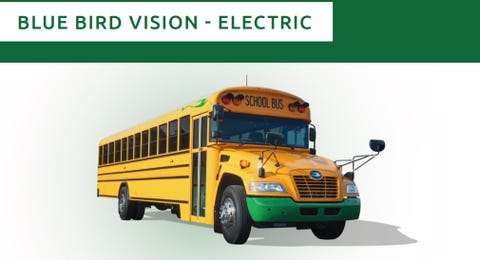- Blue Bird delivers 300th electric bus since 2018
- School bus maker now offers 3 different EV bus models
- School buses only need a range of about 100 miles per 24-hour period
If there is one iconic American vehicle needing to become an EV as soon as possible, it's the school bus. Best known for using the same styling for decades and for belching out thick clouds of diesel exhaust into cars behind them, like tanks deploying smoke screens, school buses can at times be smelled from hundreds of yards away. But they have largely avoided any kind of regulatory wrath when it comes to air quality.
That's slowly changing as Blue Bird, the U.S.' leading school bus producer, is now set to deliver its 300th electric school bus after supplying a California district with 100 electric buses earlier in 2020. The company began taking orders for its first electric Type C and Type D models in early 2018, featuring a 160-kWh battery pack good for a 100 to 120-mile range. Blue Bird's buses not only feature better power and acceleration abilities than existing diesel models powered by Cummins engines, but like other EVs they also promise lower maintenance requirements when it comes to service, lacking traditional transmissions. The buses feature CCS1 connectors, allowing for AC charging and DC fast-charging, using stations Blue Bird also built. And it's Cummins itself producing the electric drivetrains powering the buses.
The school bus maker debuted three different EV models in 2018, all based on existing gas and diesel-engined models, including the Micro Bird G5 electric for 30 passengers, the cab-forward All America RE Electric with an 84-passenger capacity, and the Vision Electric with a front-positioned hood and a 77-passenger capacity. The two larger buses have up to a 12-mile range while the smaller 30-passenger bus has up to a 100-mile range.
"Blue Bird is honored to have received its 300th electric bus order in November, confirming our position as the #1 EV school bus manufacturer in the United States," said David Bercik, senior vice president of Sales and Marketing. "Based on the interest level in Blue Bird electric buses from school districts, we expect the sales pace to increase in the future. While the pandemic has impacted the industry, the Blue Bird team is focused on maintaining our delivery commitments to each and every customer."
School buses are actually well suited to becoming EVs because they largely operate during certain hours of the day, serve a limited geographic area, and spend their downtime at their fleet garages. This allows them to be charged in the late afternoon and overnight without the need for DC fast-charging technology. They also don't need a large battery with a range more than 150 miles because they just don't travel that much in a given 24-hour time span. This makes them similar to delivery trucks logistics companies use. They're also undergoing an EV revolution of their own, but have received far more pitches from manufacturers old and new than from school bus manufacturers.
In effect, several start-ups and automakers are trying to make logistics giants, chain stores, and the USPS switch to electric vehicles. But school bus fleets have largely been overlooked. So while the order of the 300th Blue Bird electric school bus is an important step in the right direction, there is still a long way to go before even a small percentage of school buses in all U.S. states become zero-emissions vehicles. Blue Bird itself has been working on EV bus technology since 1994, but did not begin to offer today's EV models to school districts until relatively recently. They've also offered CNG, propane and gas-engined buses in the past.
So we're still in the early days of school buses going electric. Many thousands more electric buses have to be built and purchased by school districts before hitting some kind of dramatic milestone such as 5% of all school buses in the country being electric. That's still years away, likely more than a decade, and given the regulatory priorities and school bus lifespans it's safe to say diesel buses being built today will be in service for some time. So in the horse race of passenger cars, logistics trucks, grocery store semis and school buses becoming EVs over time, we wouldn't advise betting on school buses getting over the 10% or 20% mark first.
This content is created and maintained by a third party, and imported onto this page to help users provide their email addresses. You may be able to find more information about this and similar content at piano.io
"bus" - Google News
December 15, 2020 at 01:20AM
https://ift.tt/3qWYaSo
School Buses Are Going Electric, but Not Too Fast - Autoweek
"bus" - Google News
https://ift.tt/2rp2JL3
https://ift.tt/3aT1Mvb
Bagikan Berita Ini
















0 Response to "School Buses Are Going Electric, but Not Too Fast - Autoweek"
Post a Comment